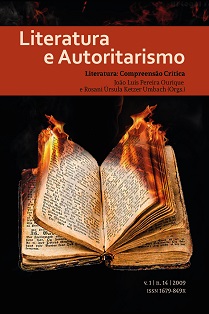Wonder or apprehension at Italy's eulogy? The second book of Virgil's "Georgics"
DOI:
https://doi.org/10.5902/1679849X73905Keywords:
Georgics, Grafting, Italy praise, Polyphony, MonstrosityAbstract
In the Georgics and, in the poem’s second book, in parts related to the description of the grafting technic and to the praise of Italy, land which is contrasted with the Orient, we have elements for the discussion of Virgil’s “polyphony”. Here, we are talking about the meaning phenomenon which has to do with the multiplicity of viewpoints about the same themes sequentially expressed. This way, we propose an examination of this question, incorporating specialized bibliography and the reading of the poem itself.
Downloads
References
CATO; VARRO. On agriculture. With an English translation by H. D. Hooper. Cambridge, Massachusetts/ London, England: Harvard University Press, 1999.
CATULO. O livro de Catulo. Tradução, introdução e notas por J. A. Oliva Neto. São Paulo: Edusp, 1996.
DALZELL, Alexander. The criticism of didactic poetry: essays on Lucretius, Virgil and Ovid. Toronto/ Buffalo/ London: University of Toronto Press, 1997.
ERNOUT, Alfred; MEILLET, Antoine. Dictionnaire étymologique de la langue latine. Paris: Klincksieck, 1939.
FARRELL, Joseph. Vergil’s “Georgics” and the traditions of ancient epic. New York/ Oxford: Oxford University Press, 1991.
GALE, Monica. Virgil on the nature of things. The Georgics, Lucretius and the didactic tradition. Cambridge: University Press, 2000.
HESÍODO. Os trabalhos e os dias. Tradução, introdução e comentários de Mary de C. N. Lafer. São Paulo: Iluminuras, 2008.
JEHA, Júlio. Monstros como metáforas do mal. In: __________. Monstros e monstruosidades na literatura. Belo Horizonte: UFMG, 2007.
QUINTE-CURSE; JUSTIN; VALÈRE MAXIME; JULIUS OBSEQUENS. Oeuvres complètes avec la traduction en français. Publiées sous la direction de M. Nisard. Paris: Firmin Didot, 1864.
ROBERT, Jean-Noël. La vie à la campagne dans l’antiquité romaine. Paris: Les Belles Lettres, 1985.
ROSS, David O. Virgil’s elements. Physics and poetry in the “Georgics” . Princeton, N.J.: Princeton University Press, 1987.
TRINGALI, Dante. Introdução à retórica. A retórica como crítica literária. São Paulo: Duas Cidades, 1988.
VIRGIL. Georgics. Edited by R. F. Thomas. Cambridge: University Press, 1994. Vol. I.
VIRGILE. Géorgiques. Texte traduit par E. de Saint-Denis, introduction notes et postface par J. Pigeaud. Paris: Les Belles Lettres, 1998.
VIRGÍLIO. Bucólicas. Tradução e notas de Odorico Mendes. Cotia/ Campinas: Ateliê Editorial/ UNICAMP, 2008.
WILKINSON, Lancelot Patrick. The "Georgics" of Virgil. A critical survey. Norman: University of Oklahoma Press, 1997.
Downloads
Published
How to Cite
Issue
Section
License
DECLARAÇÃO DE ORIGINALIDADE E EXCLUSIVIDADE E CESSÃO DE DIREITOS AUTORAIS
Declaro que o presente artigo é original e não foi submetido à publicação em qualquer outro periódico nacional ou internacional, quer seja em parte ou na íntegra. Declaro, ainda, que após publicado pela Literatura e Autoritarismo, ele jamais será submetido a outro periódico. Também tenho ciência que a submissão dos originais à Literatura e Autoritarismo implica transferência dos direitos autorais da publicação digital. A não observância desse compromisso submeterá o infrator a sanções e penas previstas na Lei de Proteção de Direitos Autorais (nº 9610, de 19/02/98).






